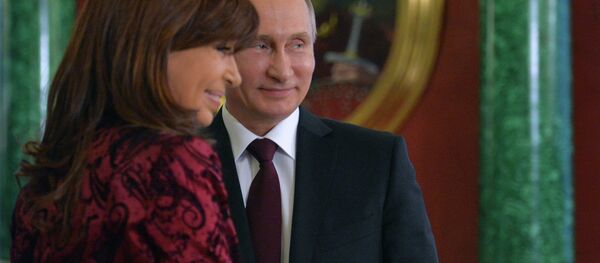MOSCOW (Sputnik) — The cooperation agreements that Argentina has recently signed with Russia could be a Buenos Aires' response to the situation with the disputed Falkland islands territories, former Russian ambassador to Argentina Evgeny Astakhov told Sputnik Friday.
“I think it is an Argentinian response to the history of the Falklands,” Astakhov said.
The former ambassador added that the West has traditionally supported the United Kingdom in the dispute, which shaped the geopolitical situation in the region and set the Buenos Aires’ foreign policies.
Argentina claims that it has inherited the Falkland Islands, located about 300 miles off the country's east coast, after they became independent of Spain. The territorial dispute with the United Kingdom saw a 74-day Falklands War in 1982, when Argentina invaded and briefly occupied the islands.
In March 2013, residents of the Falklands almost unanimously voted for the archipelago to remain an Overseas Territory of the United Kingdom.
He noted however, that the growing cooperation between Russia and Argentina does not mean that Buenos Aires is seeking confrontation with the United States.
“These concepts should not be mixed. The development of ties between [Argentina] and Russia does not mean a confrontation with the United States,” Astakhov said.
The former ambassador added that conflict with the United States is not in the interests of Argentina.
Argentina is an independent and economically self-sufficient country with reserves of oil and gas, which is a common field of interest between Moscow and Buenos Aires, Astakhov added.
Argentine President Cristina Fernandez de Kirchner met with Russian President Vladimir Putin on Thursday in Moscow. The sides have signed a number of cooperation deals and confirmed that the bilateral ties between Moscow and Buenos Aires are strengthening.
Evgeny Astakhov also added that Argentina will cooperate with BRICS countries to moderate the US dollar's dominance in the global financial system.
“I think that Argentina will join the efforts to make changes in the financial system and the global economy,” Astakhov said.
“This situation is not convenient for China, not for India, Brazil or Argentina, which want to integrate into the recently established BRICS Development Bank,” Astakhov stressed.
The former envoy added that the BRICS countries are now discussing the possibilities of payments in national currencies to overcome the dominance of the US dollar.
The BRICS is group of prominent emerging economies comprising Brazil, Russia, India, China and South Africa. As of 2014, the five BRICS economies represented some 40 percent of the world population generating a total of about 20 percent of the gross world product.



